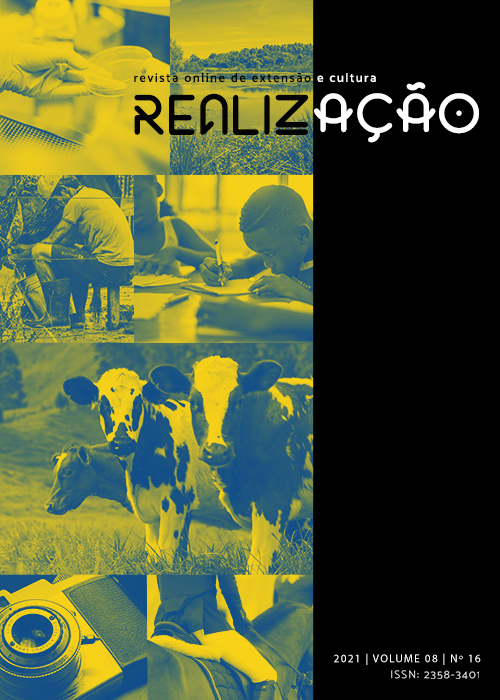Animal Athlete: animal participation in sports practices on a perspective of the agricultural sciences community
DOI:
https://doi.org/10.30612/realizacao.v8i16.15381Keywords:
Animal sport, Agrarian professionals, Animal welfareAbstract
The Vaquejadas, Rodeios and Tie Tests are sports and cultural modalities of our country that have been intertwined in the daily lives of many Brazilians for many generations. The aim of this work is to analyze the opinion of professionals and students of agrarian sciences across the country about such practices. A descriptive research was carried out – exploratory via a questionnaire, available on the internet from Google Docs forms – from which 250 records were obtained. The current scenario of the activity shows several points that are still much discussed and controversial. In the analysis of the results, most interviewees are aged between 15 and 25 years old; they are men and women with complete higher education, knowledgeable about welfare precepts, who agree with the use of animals in the practice of sports and know the legislation that regulates these practices. It is observed that 39.6% of this public partially agree with the use of animals in this practice of sports, another 35.2% totally agree and 13.9% disagree with the use of animals for sporting purposes. As for inspection, 84% of respondents think that Brazil does not inspect this segment, requiring greater care. When asked to the participants about what would be necessary for the animals to have their rights guaranteed, 41.2% reported awareness by the population, 29.6% government inspection and 25.5% prohibition of any practice that could harm the animals. It is concluded with this work that the population of agrarian sciences partially agrees with the use of animals in sports practices, with the vaquejada being the sport that most affects the animals' well-being. Furthermore, respondents claim that there should be greater government oversight of the use of animals in sports and greater awareness of the population regarding the use of animals in sports, in order to ensure the well-being of these animals.
Downloads
References
AMORIM, L. M. P. V. et al. Percepção e atitude da população de Lauro de Freitas, Bahia, em relação aos animais: dados preliminares. In: CONGRESSO INTERNACIONAL DE CONCEITOS EM BEM-ESTAR ANIMAL, 2., 2007, Rio de Janeiro. Anais... Rio de Janeiro: WSPA, 2007.
AMORIM, B. P.; OLIVEIRA, C. E. C.; OLIVEIRA CAETANO, G. A. Maus tratos aos animais em manifestações culturais: uma análise sobre a perspectiva jurídica. PUBVET, v.14, n.1, a498, p.1-14, Jan., 2020.
BUONORA ,G.S. et al. Estudo da ocorrência de leões gástricas em cavalos de vaquejada . Braz j vet Res anim Sci, v.41 (supl), p.263-264, 2004.
BRANDÃO, I.M. Crimes ambientais: uma visão sobre as práticas do rodeio e da vaquejada. Interfaces Cientificas - Direito. v.2, n.2, p.93-104, 2014.
FRASER, D., et al. A scientific conception of animal welfare that reflects ethical concerns. Animal Welfare, v.6, n.3, p.187-205, 1997.
GERALDO, ADRIANO et al. Perfil dos produtores e consumidores de carne de frango caipira na região do Alto São Francisco–MG. RealizAção, v. 7, n. 14, p. 81-93, 2020.
LEITE, Gabriela Duarte Oliveira et al. Desenvolvimento de atividade entre alunos e animais de companhia resgatados. RealizAção, v. 7, n. 14, p. 14-22, 2020.
PANICACCI, F.L. Os rodeios e a jurisprudências paulista sobre as práticas que submetem animais a crueldade. p.1-27, 2012.
SIMON, V.; et al. O rodeio como uma prática esportiva de identidade cultura na região Sul do Brasil. Pubvet. v.12, n.12, a 201, p. 1-6, 2018. Doi: 10.31553/pubvet.v12n11a20.1-6
KUKUL, I. M. Maus tratos aos animais: A anã lise da constitucionalidade das festas de rodeio. Contribuciones a las Ciencias Sociales, 1, p.1-10, 2017.
LOPES, K. R. F.; BATISTA, J. S.; DIAS, R. V. C; SOTO-BLANCO, B. INFLUÊNCIA DAS COMPETIÇÕES DE VAQUEJADA SOBRE OS PARÂMETROS INDICADORES DE ESTRESSE EM EQUINOS. Ciência Animal Brasileira, v. 10, n. 2, p. 538-543, abr./jun. 2009.
Downloads
Published
How to Cite
Issue
Section
License
Copyright (c) 2022 Guilherme Resende de Almeida, Jean Kaique Valentim, Alexander Alexandre de Almeida, Tatiana Marques Bittencourt, Joyce Zanella

This work is licensed under a Creative Commons Attribution-NonCommercial-ShareAlike 4.0 International License.
Autores que publicam nesta revista aceitam as normas de publicação, bem como, concordam com os seguintes termos:
(a) O Conselho Editorial se reserva ao direito de efetuar, nos originais, alterações da Língua portuguesa para se manter o padrão culto da língua, respeitando, porém, o estilo dos autores.
(b) Autores mantêm os direitos autorais e concedem à revista o direito de primeira publicação, com o trabalho simultaneamente licenciado sob a Creative Commons Atribuição-NãoComercial-CompartilhaIgual 4.0 Internacional que permite: Compartilhar — copiar e redistribuir o material em qualquer suporte ou formato e Adaptar — remixar, transformar, e criar a partir do material. A Creative Commons Atribuição-NãoComercial-CompartilhaIgual 4.0 Internacional considera os termos seguintes:
- Atribuição — Você deve dar o crédito apropriado, prover um link para a licença e indicar se mudanças foram feitas. Você deve fazê-lo em qualquer circunstância razoável, mas de nenhuma maneira que sugira que o licenciante apoia você ou o seu uso.
- NãoComercial — Você não pode usar o material para fins comerciais.
- CompartilhaIgual — Se você remixar, transformar, ou criar a partir do material, tem de distribuir as suas contribuições sob a mesma licença que o original.
- Sem restrições adicionais — Você não pode aplicar termos jurídicos ou medidas de caráter tecnológico que restrinjam legalmente outros de fazerem algo que a licença permita.


